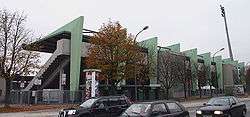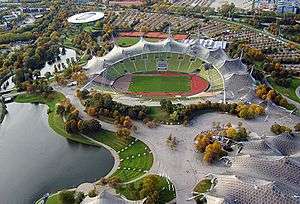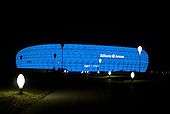TSV 1860 Munich
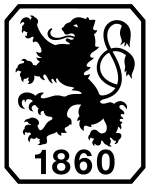 | ||||
| Full name | Turn- und Sportverein München von 1860 | |||
|---|---|---|---|---|
| Nickname(s) |
Die Löwen (The Lions) Sechzig (Sixty) (Die) Sechzger ((The) Sixties) Münchens große Liebe (Munich's great love) | |||
| Founded |
17 May 1860, football on 6 March 1899 | |||
| Ground | Allianz Arena | |||
| Capacity | 75,024 | |||
| President | Peter Cassalette | |||
| Chairman | Hasan Abdullah Ismaik | |||
| Head Coach | Daniel Bierofka | |||
| League | 2. Bundesliga | |||
| 2015–16 | 15th | |||
| Website | Club home page | |||
|
| ||||
Turn- und Sportverein München von 1860, commonly known as TSV 1860 München (German pronunciation: [teː ʔɛs faʊ ˈʔaxtseːnˈhʊndɐt ˈzɛçtsɪç ˈmʏnçn̩]) or 1860 Munich, is a German sports club based in Munich. The club's football team plays in the 2. Bundesliga, after relegation from the Bundesliga following the 2003–04 season. 1860 Munich was one of the founding members of the Bundesliga in 1963, becoming West German champions in 1966, and has played a total of 20 seasons in the top flight. Since 2005, 1860 Munich's stadium has been the Allianz Arena. 1860 Munich has a rivalry with Bayern Munich.
History
Origins of the club
The roots of the TSV's founding as a physical fitness and gymnastics association go back to a meeting held 15 July 1848 in a local pub, Buttlesche Brauerei zum Bayerischen Löwen. It was a time of revolutionary ferment due to the 1848 Revolutions, and the club was banned in 1849 by the Bavarian monarchy for "republican activities". The club was formally reestablished on 17 May 1860 and after mergers with a number of other local associations in 1862 was known as Turnverein München. A football department was created on 6 March 1899 and played its first matches against other squads three years later.
1900–1945
In 1911, the team adopted the familiar lion to their crest and in 1919 was renamed TSV München 1860. By the mid-1920s, they were playing competitive football in the country's upper leagues, like the Bezirksliga Bayern, making a national semi-final appearance in 1927. Die Löwen challenged for the championship in 1931 but dropped a 2–3 decision to Hertha BSC. Two years later, they made another semi-final appearance which they lost to Schalke 04 who were on their way to becoming the dominant side in German football through the 1930s and 1940s.
In 1933, German football was re-organized under the Third Reich into 16 top-flight divisions known as Gauligen. TSV joined the Gauliga Bayern where they earned second-place finishes in 1934, 1938 and 1939 before finally capturing a division championship in 1941. Their subsequent play-off appearance saw them finish second in their pool to finalist Rapid Wien. The following season they failed to advance to the national play-off rounds, but did go on to earn their first major honours by defeating Schalke 04 to capture the Tschammerpokal, known today as the DFB-Pokal. TSV returned to the national play-offs again in 1943, progressing to the quarter-finals.
Post war
After World War II, 1860 played in the top flight Oberliga Süd as a mid-table side, suffering relegation for a period of three years in the mid-1950s. However, they delivered when it mattered most in 1963 by winning the league championship and with it automatic entry into Germany's new professional league, the Bundesliga, ahead of rivals Bayern Munich, who would have to wait two seasons for their own top flight debut since the German Football Association (DFB) did not want two teams from the same city in the new league. 1860 continued to perform well through the mid-1960s: they captured their second DFB-Pokal in 1964, played the 1965 European Cup Winners' Cup final against West Ham United – losing 0–2, came away as Bundesliga champions in 1966, and finished as runners up the next year.
The 1970s, 1980s and 1990s
Those performances were followed by poor showings in three consecutive seasons leading to relegation in 1970 to the Regionalliga Süd (II). It took 1860 seven years to make their way back to the first division, through a three-game play-off contest with Arminia Bielefeld, only to be immediately relegated again. One year later they were back, this time for a two-year stay, then in 1982 they were relegated once again and then forced into the tier III Amateur Oberliga Bayern when financial problems led to the club being denied a licence.
The club's exile from the Bundesliga would last a dozen years. They were promoted to the top flight in 1994, but found themselves in immediate danger being sent back down again. President Karl-Heinz Wildmoser and manager Werner Lorant, however, made several shrewd purchases including striker Olaf Bodden, winger Harald Cerny, playmaker Peter Nowak and defensive stoppers Miroslav Stević, Jens Jeremies and Manfred Schwabl. Stars like Abedi Pele, Thomas Häßler and Davor Šuker played for 1860 as their careers were winding down, becoming crowd favourites and making important contributions.
2000–present
Under the heavy-handed, dictatorial leadership of Wildmoser and Lorant, the combination of proven veterans and young talent helped the club avoid relegation and become a decent mid-table side. 1860 earned a fourth-place Bundesliga finish in 2000 and were entered into the UEFA Champions League third qualifying round, where they faced Leeds United. A 3–1 aggregate defeat, however, saw them play in the UEFA Cup that season, advancing to the third round where they were eliminated by Parma. The club, however, was unable to build on this success and after some mediocre performances by the team, manager Lorant was fired.
After a decade in the top division, 1860 burnt out in the 2003–04 season with a 17th-place finish that returned the club to the 2. Bundesliga. Wildmoser made the controversial decision to groundshare with hated rivals Bayern Munich in the Allianz Arena, a move that outraged fans and led to accusations of a sell-out. His downfall came when he and his son Karl-Heinz Wildmoser Jr. were caught in a bribery scandal around the awarding procedure for the contract to build the stadium.
In addition to closely being relegated to the Regionalliga Süd (III) in the 2005–06 season, 1860 experienced severe financial difficulties. Stadium partner Bayern Munich bought out TSV's 50% interest in the Allianz Arena in late April 2006 for €11 million, providing the club some immediate financial relief. Following this move, the DFB was satisfied with the financial health of the club and duly issued 1860 a licence to play in the 2. Bundesliga for the 2006–07 season.
TSV hired several new managers during its 2. Bundesliga period. The first was Rudi Bommer, followed by Reiner Maurer, Walter Schachner, Marco Kurz and Uwe Wolf. Also, former Germany national team player Stefan Reuter as a general manager. Neither of the new managers, however, could lead the squad back to the top-flight Bundesliga. Ewald Lienen coached the team from 13 May 2009 to the end of the 2009–10 season. Reiner Maurer has been coaching 1860 since the start of the 2010–11 season.
1860 came close to insolvency for a second time in five years in 2011 when it needed €8 million to survive. Help was offered to the club by local rival Bayern Munich, to the disgust of the supporters of each club, since Bayern was to lose €50 million in future stadium rent if the club defaulted on its rental contract obligations until 2025. Eventually, the club was rescued by Jordanian investor Hasan Abdullah Ismaik, who, for €18 million, purchased 60% of the club's professional team's operating company, 1860 GmbH & Co. KGaA'. However his voting rights being restricted to 49% due to regulations governing German football, which is based around membership-led clubs and not entrepreneurial. H. I. Squared International, a company controlled by Ismaik, took over the marketing of the club from IMG.[1][2]
The 2014–15 season saw the club finish 16th in the 2. Bundesliga. It was forced to participate in the relegation play-offs against Holstein Kiel where it retained its league place with a 2–1 home win after a 0–0 draw in the first leg. 1860 survived courtesy to an injury time goal by defender Kai Bülow in front of 57,000 spectators in Munich.[3]
Reserve team
The TSV 1860 München II, or, previous to that, the TSV 1860 München Amateure, have been historically quite successful at the Bavarian level. The team has played in the Regionalliga Süd from 2004 to 2012, missing out on 3. Liga qualification in the 2007–08 season and again in 2013 when it won the newly formed Regionalliga Bayern but lost to SV Elversberg in the promotion round.
The second eleven struggled during the club's years outside professional football, but rose through the ranks again after the club's revival in the early 1990s and returned to the Bayernliga in 1996, winning the title in its first season there and promotion to the Regionalliga. The team belonged to the Regionalliga until 2001 and then again from 2004 onwards.
The club is the only one in Bavaria to have won the Bayernliga with its first and second team.
Ground
1860 Munich play their home matches in the Allianz Arena, which they share with city rivals Bayern Munich. The arena's skin color lighting is changed to 1860's blue when the team plays. The club's inaugural game at the Allianz Arena was a friendly played against FC Nuremberg on 30 May 2005. The stadium hosted the opening match of the 2006 World Cup between Germany and Costa Rica and three other first round contests, a Round of 16 match between Germany and Sweden, and a semi-final between France and Portugal.
Until recently the club co-owned the facility with Bayern Munich, but sold its 50% share on 28 April 2006 to help resolve a serious financial crisis that saw TSV facing bankruptcy.
Originally TSV played in the Stadion an der Grünwalderstraße (commonly known as "Sechzgerstadion"), built in 1911, and which they also shared with Bayern Munich between 1925 and 1972. Both clubs then moved to the new Olympiastadion built for the 1972 Olympic Games. TSV moved back to the old ground several times from 1972 on, with the years between 1982 and 1995 being the longest period. In the 2004 season "TSV" spent one last year at Sechzger as the Allianz was being readied. TSV 1860 München have not been able to meet the capacity standards of the Allianz Arena and are currently looking for a new stadium (due to the fact that they share no rights of the Allianz Arena) in which to play future years. The Lions will stay in the Allianz until 2025.[4]
Recent seasons
The recent season-by-season performance of the club:[5][6]
| Year | Division | Position | Average Home Attendance |
| 1988–89 | Bayernliga (III) | 5th | NA |
| 1989–90 | Bayernliga | 2nd | NA |
| 1990–91 | Bayernliga | 1st ↑ | NA |
| 1991–92 | 2. Bundesliga (II) | 10th ↓ | 15,968 |
| 1992–93 | Bayernliga (III) | 1st ↑ | NA |
| 1993–94 | 2. Bundesliga (II) | 3rd ↑ | 19,184 |
| 1994–95 | Bundesliga (I) | 14th | 23,140 |
| 1995–96 | Bundesliga | 8th | 32,105 |
| 1996–97 | Bundesliga | 7th | 34,648 |
| 1997–98 | Bundesliga | 13th | 29,348 |
| 1998–99 | Bundesliga | 9th | 28,417 |
| 1999–00 | Bundesliga | 4th | 27,282 |
| 2000–01 | Bundesliga | 11th | 25,276 |
| 2001–02 | Bundesliga | 9th | 26,024 |
| 2002–03 | Bundesliga | 10th | 26,518 |
| 2003–04 | Bundesliga | 17th ↓ | 28,331 |
| 2004–05 | 2. Bundesliga (II) | 4th | 20,140 |
| 2005–06 | 2. Bundesliga | 13th | 41,720 |
| 2006–07 | 2. Bundesliga | 8th | 35,688 |
| 2007–08 | 2. Bundesliga | 11th | 35,071 |
| 2008–09 | 2. Bundesliga | 12th | 28,135 |
| 2009–10 | 2. Bundesliga | 8th | 22,515 |
| 2010–11 | 2. Bundesliga | 9th | 19,768 |
| 2011–12 | 2. Bundesliga | 6th | 22,898 |
| 2012–13 | 2. Bundesliga | 6th | 22,682 |
| 2013–14 | 2. Bundesliga | 7th | 19,312 |
| 2014–15 | 2. Bundesliga | 16th | 21,917 |
| 2015–16 | 2. Bundesliga | 15th | |
| 2016–17 | 2. Bundesliga |
| ↑ Promoted | ↓ Relegated |
Honours
League
Cup
|
Youth
Reserve team
|
Players
For recent transfers, see Transfers summer 2016 and Transfers winter 2015–16.
Current squad
- As of 7 October 2016[7]
Note: Flags indicate national team as defined under FIFA eligibility rules. Players may hold more than one non-FIFA nationality.
|
|
TSV 1860 Munich II squad
Managers
 Fred Spiksley (1913)
Fred Spiksley (1913) Max Merkel (1963–66)
Max Merkel (1963–66) Hans-Wolfgang Weber (1966–67)
Hans-Wolfgang Weber (1966–67) Gunter Baumann (1967)
Gunter Baumann (1967) Albert Sing (1967–68)
Albert Sing (1967–68) Hans Pilz (1968–69)
Hans Pilz (1968–69) Fritz Langner (1969)
Fritz Langner (1969) Franz Binder (1969–70)
Franz Binder (1969–70) Hans Tilkowski (1970–72)
Hans Tilkowski (1970–72) Elek Schwartz (1972–73)
Elek Schwartz (1972–73) Rudi Gutendorf (1973–74)
Rudi Gutendorf (1973–74) Max Merkel (1974–75)
Max Merkel (1974–75) Heinz Lucas (1975–78)
Heinz Lucas (1975–78) Eckhard Krautzun (1978–79)
Eckhard Krautzun (1978–79) Alfred Baumann (1979)
Alfred Baumann (1979) Carl-Heinz Rühl (1979–81)
Carl-Heinz Rühl (1979–81) Wenzel Halama (1981–82)
Wenzel Halama (1981–82) Willibert Kremer (1982)
Willibert Kremer (1982) Kurt Schwarzhuber (1982)
Kurt Schwarzhuber (1982) Erich Beer (1983)
Erich Beer (1983) Bernd Patzke (1983–84)
Bernd Patzke (1983–84) Octavian Popescu (1984)
Octavian Popescu (1984) Erich Beer (1984)
Erich Beer (1984) Wenzel Halama (1984–86)
Wenzel Halama (1984–86) Dieter Kurz (1986)
Dieter Kurz (1986)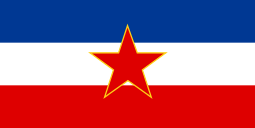 Fahrudin Jusufi (1986–87)
Fahrudin Jusufi (1986–87) Thomas Zander (1987)
Thomas Zander (1987) Uwe Klimaschewski (1987–88)
Uwe Klimaschewski (1987–88) Willi Bierofka (1988–90)
Willi Bierofka (1988–90) Karsten Wettberg (1990–92)
Karsten Wettberg (1990–92) Werner Lorant (1992–01)
Werner Lorant (1992–01) Peter Pacult (2001–03)
Peter Pacult (2001–03) Falko Götz (2003–04)
Falko Götz (2003–04) Gerald Vanenburg (2004)
Gerald Vanenburg (2004) Rudolf Bommer (2004)
Rudolf Bommer (2004) Reiner Maurer (2004–06)
Reiner Maurer (2004–06) Bernhard Trares (2006)
Bernhard Trares (2006) Walter Schachner (2006–07)
Walter Schachner (2006–07) Marco Kurz (2007–09)
Marco Kurz (2007–09) Uwe Wolf (2009)
Uwe Wolf (2009) Ewald Lienen (2009–10)
Ewald Lienen (2009–10) Reiner Maurer (2010–12)
Reiner Maurer (2010–12) Alexander Schmidt (2012–13)
Alexander Schmidt (2012–13) Friedhelm Funkel (2013–14)
Friedhelm Funkel (2013–14) Markus von Ahlen (2014)
Markus von Ahlen (2014) Ricardo Moniz (2014)
Ricardo Moniz (2014) Markus von Ahlen (2014–15)
Markus von Ahlen (2014–15) Torsten Fröhling (2015)
Torsten Fröhling (2015) Benno Möhlmann (2015–16)
Benno Möhlmann (2015–16) Daniel Bierofka (2016)
Daniel Bierofka (2016) Kosta Runjaić (2016)
Kosta Runjaić (2016) Daniel Bierofka (2016–)
Daniel Bierofka (2016–)
Sponsorship
| Year | Kit Manufacturer | Sponsor | Industry |
|---|---|---|---|
| 1963–73 | Adidas | no sponsor | |
| 1973–76 | Frucade | Drinks | |
| 1976–79 | Puma | ||
| 1979–81 | Doppeldusch | Skin Care | |
| 1981–83 | Hedos | Clothing | |
| 1983–86 | Vereinigte | Insurance | |
| 1986–89 | Löwenbräu | Brewery | |
| 1989–90 | Karnehm | Furniture | |
| 1990–91 | Hacker-Pschorr | Brewery | |
| 1991–93 | Lancia | Automobile | |
| 1993–94 | Lotto | Ha-Ra | Cleaning |
| 1994–95 | Löwenbräu | Brewery | |
| 1995–99 | Nike | ||
| 1999–02 | FTI | Tourism | |
| 2002–05 | Liqui Moly | Motor Oil | |
| 2005–06 | Festina | Watches | |
| 2006–07 | Kappa | bwin | Sports Betting |
| 2007–08 | trenkwalder | Personal Services | |
| 2008–09 | Erima | ||
| 2009–10 | Liqui Moly | Lubricants | |
| 2010–11 | Comarch | Software | |
| 2011–13 | Uhlsport | Aston Martin | Automobile |
| 2013–15 | Volkswagen | Automobile | |
| 2015–16 | Macron | ||
| 2016–17 | Die Bayrische | Insurance | |
References
- ↑ "TSV 1860 München: Kampf ums Überleben spitzt sich zu" (in German). Augsburger Allgemeine. 23 March 2011. Retrieved 17 July 2011.
- ↑ "Der zurückhaltende Geheimfavorit" (in German). Augsburger Allgemeine. 15 July 2011. Retrieved 17 July 2011.
- ↑ Schon wieder Drama! Sechzig bleibt drin! (German) Weltfussball.de, published: 2 June 2015, accessed: 3 June 2015
- ↑ "A brief history of the Allianz Arena". FC Bayern Munich. Retrieved 11 September 2016.
- ↑ "Das deutsche Fußball-Archiv" (in German).
- ↑ "Ergebnisse" (in German). Fussball.de.
- ↑ "Profis". TSV 1860 Munich. Retrieved 7 October 2016.
External links
| Wikimedia Commons has media related to TSV 1860 München. |
Coordinates: 48°6′7.1″N 11°33′55.1″E / 48.101972°N 11.565306°E
